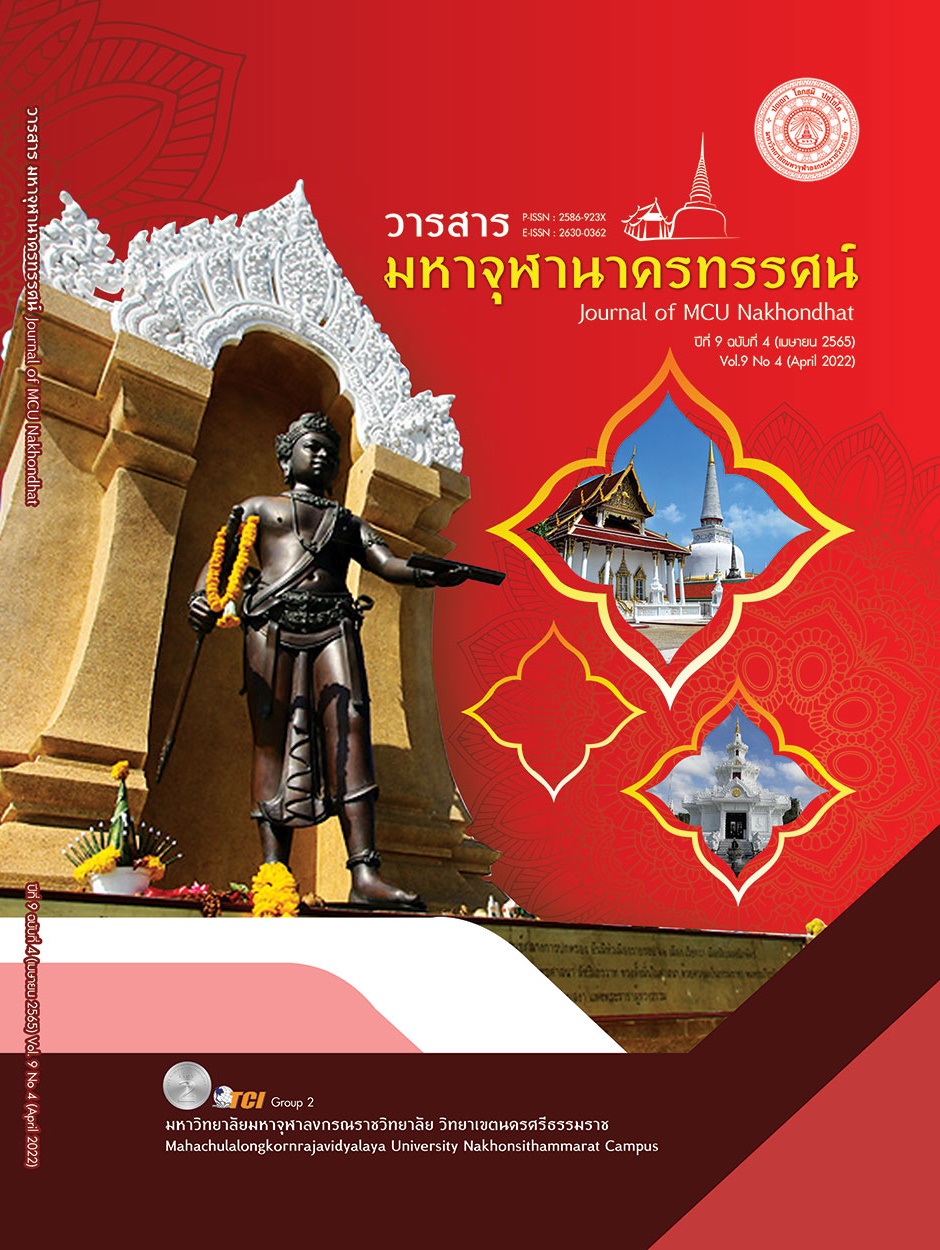SATISFACTION EXPECTATION AND DEMAND IN ONLINE CLASS OF TUTORING SCHOOL DURING COVID-19 PANDEMIC
Main Article Content
Abstract
The objectives of this article were 1) investigate the satisfaction of online learning in tutoring school during the COVID-19 lockdown 2) investigate the expectation of students and guardian toward the tutoring school during the online tutoring class 3) provide suggestion to the tutoring school to meet satisfaction of students and guardian during the COVID-19 pandemic. The study was conducted by mixed method using questionnaires of 60.6% female and 39.4% male age 13-19 years old from 5 tutoring schools. An in-depth interview of 1 student and 1 tutoring teacher. The study found that students are most satisfy with the topic learnt during the online class (4.21±1.12) and the least satisfy with the amount of assignments(1.94±1.03). They expect the efficiency to be equal as they have taught in person (4.66±0.75). They expect to access to tutoring teacher after the class to ask questions (4.50±0.50). They expect the tutoring school to give discount on the courses (4.17±0.37). The demand of online classes after the pandemic shows that 62.5% prefer an offline class with some online classes, 25% prefer online class with some offline classes and 12.5% of students do not want to study via online at all. The result from in-depth interview found that student want an immediate explanation of the unclear topics. An extra time after each class that allow students to ask questions, plus, the extra tools to facilitate in university admission are expected by students from tutoring schools.
Article Details

This work is licensed under a Creative Commons Attribution-NonCommercial-NoDerivatives 4.0 International License.
References
จินดารัตน์ จำปาทิพย์. (8 กันยายน 2564). การสัมภาษณ์ส่วนบุคคล. (ปัณณรุจน์ ดิศพงษ์สันต์, ผู้สัมภาษณ์)
จิรา ขาวิเศษ. (2557). ปัจจัยทางการตลาดที่มีอิทธิพลให้เกิดแรงจูงใจในการตัดสินใจเลือกโรงเรียน กวดวิชาของนักเรียนระดับชั้นมัธยมศึกษาตอนปลาย ในจังหวัดชลบุรี. วารสารวิชาการ มหาวิทยาลัยธนบุรี, 8(17), 55-71.
ปภัทร์สิริ ชุ่มศรีครินทร์. (19 กันยายน 2564). บทสัมภาษณ์ส่วนตัว. (ปัณณรุจน์ ดิศพงษ์สันต์, ผู้สัมภาษณ์)
พรหมสร เดชากวินกุล. (2552). ปัจจัยที่มีผลต่อการตัดสินใจเรียนโรงเรียนกวดวิชาของผู้เรียนระดับประถมศึกษตอนปลาย ในเขตกรุงเทพมหานคร. ใน วิทยานิพนธ์มหาบัณฑิต สาขาบริหารการศึกษา. จุฬาลงกรณ์มหาวิทยาลัย.
สิริชัย ดีเลิศ และคณะ. (ม.ป.ป.). การศึกษาพฤติกรรมและกระบวนการตัดสินใจซื้อเครื่องแต่งกายที่มีผลต่อกลุ่มดิจิตอลเนทีฟผ่านระบบพาณิชย์อิเล็กทรอนิกส์ในเขตประเวศน์ กรุงเทพมหานคร. ใน การประชุมวิชาการด้านการจัดการระดับชาติ วลัยลักษณ์วิจัยทางการจัดการ รั้งที่ 4. นครศรีธรรมราช: มหาวิทยาลัยวลัยลักษณ์.
สุดารัตน์ วุฒิมงคลพานิช. (2559). ปัจจัยที่มีผลต่อการตัดสินใจซื้อคอร์สเรียนพิเศษจากสถาบันกวดวิชา ของนักเรียนระดับชั้นมัธยมศึกษาปีที่ 1 ถึงปีที่ 6 ในเขตกรุงเทพมหานคร. ใน วิทยานิพนธ์มหาบัณฑิต สาขาบริหารการศึกษา. มหาวิทยาลัยธรรมศาสตร์.
Cochran W. G. (1963). Sampling Technique. 2nd Edition. New York: John Wiley and Sons Inc.
Dziuban C. et al. (2015). Student Satisfaction with Online Learning: Is it a Psychological Contract. Journal of Asynchronous Learning Network, 19(2), 1-15.
Emmeline B. et al. (2016). The Value of Peer Learning for First-year Postgraduate University Students’ Social and Academic Integration. Procedia - Social and Behavioral Sciences, 228(2016), 229-304.
Hojo M. (2021). Association between student-teacher ratio and teachers' working hours and workload stress: evidence from a nationwide survey in Japan. BMC public health, 21(1), 1-8.
Meulenbroeks R. (2020). Suddenly fully online: A case study of a blended university course moving online during the Covid-19 pandemic. Heliyon, 6(12), 1-7.
Nugent, T. (2009). The Impact of Teacher-student Interaction On Student Motivation And Achievement. Electronic Theses and Dissertations, 1(2009), 1-141.


